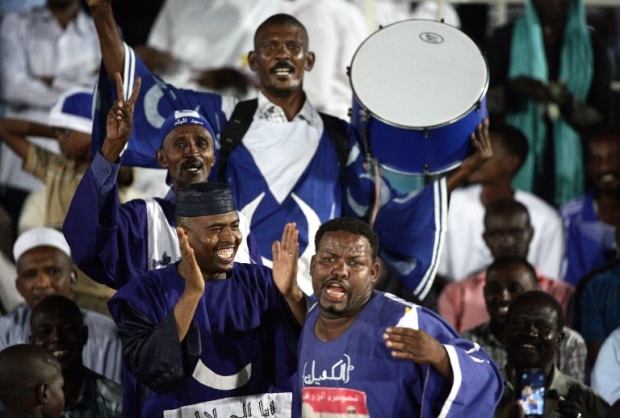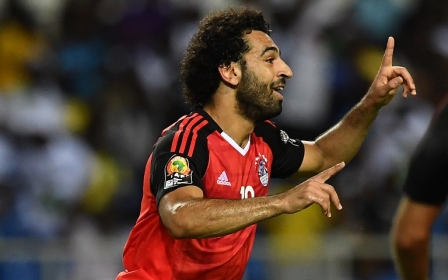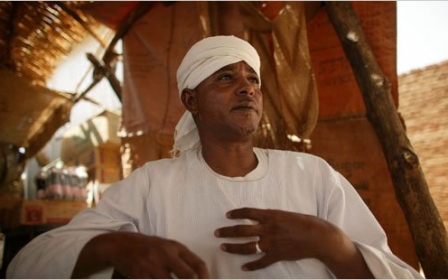Sudan's top football club fined over fans' 'gruesome' Hitler banner
KHARTOUM - Sudan's top football club has been reprimanded after some of its supporters taunted rival fans by erecting banners displaying an image of Adolf Hitler during a bitter championship decider.
Photos of the banner, which was displayed by supporters of al-Hilal Omdurman during the club’s derby match with al-Merrikh on 25 November, made headlines on sports pages in Sudan and were widely shared and condemned on social media, while world football governing body FIFA has told MEE it is seeking more information about the incident.
As well as erecting an image of the leader of Nazi Germany, fans belonging to al-Hilal's Blue Lions ultras group also held aloft letters spelling out the word "Holocaust".
Al-Hilal has said it condemns the fans responsible, although the club also posted video footage of the banners on its official Facebook page.
In a statement on the club's Facebook page on Sunday, al-Hilal said the club had been fined 40,000 Sudanese pounds ($6,000) by the Sudan Football Association while the ultras had been banned from al-Hilal's first match next season.
Other al-Hilal supporters told MEE ahead of the club’s next match, last Thursday's Sudanese cup final in which al-Hilal were beaten on penalties by al-Ahli Shandi, that they rejected racism and were disappointed by the damage caused to al-Hilal’s reputation.
Both al-Hilal and al-Merrikh are based in Khartoum’s Omdurman neighbourhood on the west bank of the Nile, with al-Merrikh representing a district which was once considered home to Sudan’s small Jewish community.
As fans of al-Hilal we respect the great values of peace and equality in football
- Ahmed Abdul Rahim
Al-Hilal’s 2-0 victory in the final league match of the season meant that they finished ahead of second-placed al-Merrikh by one point to win the Sudanese championship for the 26th time.
"Al-Hilal is the oldest football institution in the country and as fans of al-Hilal we respect the great values of peace and equality in football," fan Ahmed Abdul Rahim told MEE before Thursday's cup final.
But Saeed Abdulla, another fan, said: "It’s a conspiracy by the enemies of al-Hilal to sabotage [the club] because we won the league."
Fakhry Alsaid, also an al-Halil supporter, said the banner was not intended to offend any nation.
"This banner does not represent al-Hilal as a team, although the ultras are supporting al-Hilal, so you can’t blame the club for that. Al-Hilal has a long history of respecting the values of the sport."
Ultras are fans who model their behaviour on hardcore supporters groups in Europe notorious for a combative style that includes the display of provocative banners and chanting, confrontations with rival fans and police, and a gang culture sometimes influenced by both far right and far left ideologies.
The banner was defended by the Blue Lions, the ultras group who claimed responsibility, who said they were merely sending a "mocking" message to al-Merrikh supporters.
"We are claiming responsibility for the appearance of the Hitler banner with the word Holocaust and we are ready to bear the consequences. The only aim was to send a mocking message to our opposing fans," the Blue Lions, who are not officially associated with the club, said in a statement.
The banner was not on display at Thursday's cup final and it remains unclear whether the ultras intend to unfurl it again in the future.
'Peace, love and coexistence'
Al-Hilal officials sought to distance the club from the display and questioned why match organisers and police officers had allowed supporters to enter the stadium with the banner.
Images of the banner on social media showed security forces standing in front of it but taking no action to remove it.
“Al-Hilal Football Club strongly condemns this incident, and we would like here to stress our keen commitment to the values of peace, love and coexistence,” said club secretary General Hassan Ali Issa in a statement.
"We question how this banner was allowed to enter the stadium and the roles of the organisational committee and the police force who were tasked to inspect the stadium and the fans as they entered the stadium,” he added.
Issa said the club had agreed to launch an investigation in conjunction with the Sudanese Football Association (SFA).
The fine imposed on the club contradicted earlier statements by Nasr Eldin Hemedti, an SFA deputy chairman, who told Middle East Eye that the display of the banner was considered an "isolated incident" and said the organisation had not received any complaints.
Hemedti said the SFA was not expecting world football governing body FIFA to take any further action.
But a FIFA spokesperson told MEE that it was gathering information about the incident.
The UK-based FARE Network, which campaigns against discrimination in football, told MEE that its own investigation into the incident showed that it "was not a cultural misunderstanding but a deliberate anti-Semitic attack against the opposing club".
"The display is unacceptable in football or in society and we are disappointed with the low sanction imposed by the Sudan Football Association to al-Hilal Omdurman."
Analysts and sports writers in Sudan had called for authorities to take action amid concerns that racism and extremism among football fans could inflame tensions in a country already sharply polarised around social and political issues.
Others feared that images of the banner would damage Sudan’s international standing or lead to further punitive measures for a country still a target for sanctions by the US, the United Nations and European countries.
Clubs thrown out of Champions League
Football has traditionally been left alone by the authorities, with most clubs owned by businessmen with links to the government.
But the country has already run into trouble with FIFA this year after several clubs were ejected from African continental competitions in June when the Sudanese government dismissed the head of the football association, breaching FIFA rules forbidding political interference in football.
Both al-Hilal and al-Merrikh were thrown out of the African Champions League, the continent's most prestigious club competition.
"The matter is too serious and the SFA should take the initiative and do something before FIFA moves to impose some kind of punishment on the football activities on the entire country," Hassan Farouq, a Sudanese sports commentator, told MEE.
Farouq said he believed the fans responsible for the banner probably did not realise how offensive it was, but said the SFA had a duty to take action.
The phenomenon of the Ultras should be addressed seriously as it is feeding a fanatical atmosphere
- Muawia Aljak, sports writer
"There are many spontaneous incidents that happen between rival fans but the SFA has a responsibility to ban such acts," he said.
But Muawia Aljak, another sports writer, rejected that defence of the fans, and said that the banner had been displayed in ways that were purposefully anti-Semitic and offensive.
"They wanted to hint that al-Merrikh was founded in the al-Masalmah residential area in Omdurman where the Sudanese Jews have an old presence in the history of the city," he said.
"The phenomenon of the ultras should be addressed seriously as it is feeding a fanatical atmosphere among the normal fans, and it could extend to other political, racist or religious agendas," Aljak added.
'Lack of human sense'
A small Jewish community thrived in al-Masalmah in the early 20th century when Sudan, then under British colonial rule, became a destination for a few hundred Jewish migrants from across North Africa and the Middle East, according to the website Tales of Jewish Sudan.
Curiously, an article about the community published earlier this year features the recollections of a man who warmly remembered walking to the football stadium to watch al-Hilal, prior to leaving the country days before the 1967 Arab-Israeli war.
Jews began leaving the country following Sudan's independence in 1956 as the country aligned itself with Egypt and the Arab League in opposition to the state of Israel.
Sudan, like most other Arab states, does not have diplomatic ties with Israel and Sudanese citizens are banned from visiting Israel.
Sudanese human rights activist Moniem Adam told MEE that the banner was symptomatic of deep-rooted anti-Semitic sentiments and hatred of Israel in many Arab countries, rather than an act by fans that was "consciously racist".
"Ultras want to use any language of intimidation against opposing fans or players, but this is also a clear symbolic expression of the taboo of Israel in Middle Eastern communities due to an intensively nationalist education and media messages that create a devilish image," said Adam.
“But it also shows a lack of human sense or an understanding of the international language of peace and coexistence."
Middle East Eye propose une couverture et une analyse indépendantes et incomparables du Moyen-Orient, de l’Afrique du Nord et d’autres régions du monde. Pour en savoir plus sur la reprise de ce contenu et les frais qui s’appliquent, veuillez remplir ce formulaire [en anglais]. Pour en savoir plus sur MEE, cliquez ici [en anglais].





